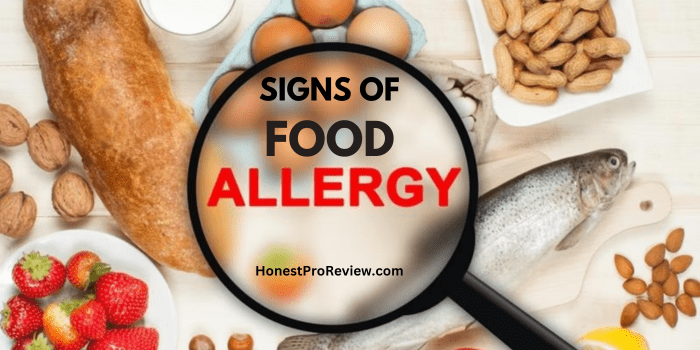Potential Signs Of Food Allergies – Detailed Explanation
Last Updated on – June 26, 2025 by Robert Dowling
An allergic reaction is a condition when your body’s immune system becomes disoriented and believes a certain meal is an allergen or toxin element. The immune system launches chemicals and immune cells to protect the body against the alleged invader as soon as you consume this meal.
Allergies to food are prevalent in infants and young children, however, allergies can strike anyone at any age. It is possible, in fact, to have a food allergy after having a certain meal for years. In the US, there are about 32 million people who have food allergies. Numerous undesirable signs, some of which might be fatal if not treated right away, are caused by food allergies.
Understanding the Allergic Reaction Signs
Your immune system’s purpose is to protect your body from pathogens and other threats so that you remain healthy. Sadly, eating a particular type of food, meal or an ingredient that is frequently found in foods might cause the immune system to become dysregulated and start activating your immune system, which can lead to a food allergy.
The symptoms of a food allergy can range in severity from quite minor to very severe. It’s also possible to react mildly to a food one time and severely the next, which is why it’s critical to stay away from anything you’re allergic to.
Also Read: Are Probiotics Supplements Good For You?
Most Common Signs of Food Allergies
1. Hives
Have you ever experienced sudden, rapid appearance and disappearance of red or colored raised pimples on your skin? Maybe it was hives. The intensity of hives can vary from moderate to quite severe. Roughly 20% of individuals will get hives at some point in their lives.
It is always best to identify and avoid the food that triggers your hives. Avoid scratching or rubbing your hives since this can make them worse. As an alternative, consider taking a warm bath in order to reduce the itching. Wearing tight and body fit cloths can aggravate your skin even more. To relieve your hives and shield your skin from further harm, apply aloe vera gel.
2. Throat and mouth itching or pain
Food allergies can become more likely to develop in people with existing sensitivities. For instance, if you have ragweed allergies, you can also get melon or banana allergies. Cross-reactivity is the reason behind this.
When your immune system is unable to distinguish between two proteins, it results in cross-reactivity. For example, the protein found in ragweed pollen is comparable to the protein in melons and bananas. You will react allergically to any of these foods if you come into contact with them.
Because of cross-reactivity, allergic reactions are typically not too severe. Though the reaction can happen over an hour later, the symptoms usually start to show up right away after consuming a raw fruit or veggie. Cross-reactivity typically results in oral symptoms such as lip, face, or tongue swelling or itching. More serious reactions, such as anaphylaxis or significant swelling of the throat, are uncommon.
3. Coughing, Wheezing and Shortness Of Breath
Many respiratory symptoms might occur when you consume a meal to which you are allergic. Breathlessness, coughing, and wheezing can all be symptoms of food allergies. Your body’s immune system will become activated when you consume a food to which you are allergic. Due to this, you may experience respiratory tract inflammation. The body uses inflammation to defend itself against harm.
Your bronchial airways may become inflamed and cause wheezing or difficulty in breathing when inflammation in the respiratory system occurs. Coughing is a usual symptom of a reaction to allergens in a food or drink since it is the body’s method of clearing extra mucus from the respiratory tract.
Also Read: Synogut Reviews – Is It Good For Your Digestive Health?
4. Anaphylaxis
A severe allergic reaction that could be fatal, anaphylaxis can cause a variety of dangerous symptoms. Your blood pressure may drop suddenly, leaving you feeling lightheaded or faint. You can feel that your throat is swelling and finding it hard to breathe.
In addition, your body can go into shock and your heart rate might drop. Anaphylaxis frequently happens after consuming an allergic food. This allergic reaction needs to be treated right away since it might be fatal. To counteract anaphylactic symptoms, an epinephrine injection needs to be given right away.
5. Digestive Discomfort
Eating a meal to which you are allergic might be quite uncomfortable for your digestive system. Food harms the small intestine as it passes through the digestive system. Nutritional deficits may arise from your body’s inability to absorb vital vitamins and minerals due to this damage. In addition, gas buildup, vomiting, diarrhea, nausea, and discomfort in the abdomen might result from injury to the intestinal system.
Stay away from troublesome foods as this is the easiest way to prevent intestinal discomfort. Avoid consuming that food again if it upsets your stomach because it can be an indication of a food allergy. Some of the symptoms you have may be relieved by several medications, but most individuals find that the majority of the symptoms go away in a few hours.
6. Difficulty in Swallowing
Eating a meal to which you are allergic might lead to an accumulation of mucus in your throat, nasal passages, and respiratory system. Swallowing may be challenging due to the irritation and thick mucus. In addition, you can feel hoarseness, nasal stuffiness, pain in your throat, or trouble speaking.
If you start to have trouble swallowing, consider sipping on something warm, such as coffee or hot tea. These beverages’ temperatures will aid in thinning mucus discharges. In addition to relieving sore throat pain, the warmth will assist reduce swelling throat tissues.
7. Immediate Signs after one bite
Food allergies usually manifest themselves within one to two hours of consuming the offending food. Coughing, hoarseness, tightness in the throat, burning or numbness in the tongue, wheezing, or anaphylaxis are some of the symptoms.
Rarely, a reaction may take up to four or six hours to manifest. When dermatitis, hives, or stomach discomfort are the primary symptoms of food allergic reactions, delayed reactions frequently follow.
Also Read: LeanBioMe Reviews – Claimed To Be Best Probiotic Supplement
Food Allergy vs. Food Intolerance
There is a common misconception that a food intolerance and a food allergy are synonymous, but they are not. The immune system is involved in an allergic reaction when exposed to a certain food, which can result in potentially fatal symptoms. On the other hand, food intolerance affects the gastrointestinal tract and results in digestive issues. A food intolerance rarely results in harmful symptoms, even though it may be uncomfortable.
Risk Factors associated with Food Allergies
Although it is hard to predict whether a kid gets a food allergy, food allergies frequently run in families. While some siblings do not have food allergies at all or have entirely separate food sensitivities, others have the same allergy.
You are more likely to get a food allergy if you already have other allergic disorders like hay fever or eczema. If you’re suffering from asthma, you are also more likely to develop a food allergy. See your doctor and have a thorough examination if you think you may have a food allergy. The intensity of food allergy symptoms varies.
While some people only have very minor symptoms, others have severe ones. Your symptoms’ intensity may also fluctuate over time. If you think you may have a food allergy, you should identify the specific foods that are making you sick. Short-term feeding regimens called elimination diets are useful in identifying common foods that trigger allergic responses.
Following the elimination of all frequent allergenic items from the dietary habits, you will gradually reintroduce each one to help identify which is generating signs of an allergic reaction, such as hives, diarrhea, and mucus buildup.
Natural Remedies to aid Food Allergies
Eliminating the problematic food from your dietary regimen should be your first course of action if you’re suffering from a food allergy. After that, you should cut out foods that cause inflammation from your daily diet. These consist of gluten, sugar, synthetic flavorings, and processed meals.
Increase your intake of probiotic-rich foods such as yogurt, sauerkraut, and kefir, as well as other healthful foods like almond butter, chia and flax seeds, bone broth, and green leafy vegetables after removing the offending food.
Add probiotics, digestive enzymes, and vitamin B5 supplements to your daily supplementation. Topically applied eucalyptus and peppermint oil can help offset the negative effects of food allergy on the body.
Most Common Food Allergens
Eggs, fish, dairy products, peanuts, shellfish, soybeans, and wheat are common food allergens, despite the fact that a wide variety of foods might trigger an allergic reaction.
When a particular meal is deemed dangerous by the immune system, food allergies can arise. It is your immune system that causes histamine to be released. Numerous symptoms, such as stomach issues, swallowing difficulties, dyspnea, rashes, itching, and throat enlargement, may manifest when this happens.
Food allergies trigger an immediate inflammatory response in the body that leads to irritation in the throat, mouth, digestive tract, and respiratory system. It’s crucial to discuss food sensitivity testing with your health physician if you’ve experienced a food reaction.
When your body’s immune system perceives food as an intruder, it can lead to food allergies, which can produce a range of unpleasant symptoms. Inflammation may arise from the immune system’s release of histamines and antibodies.
![]()







